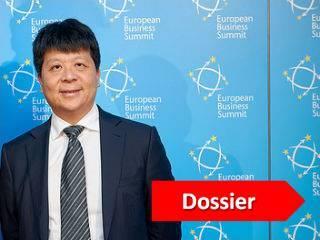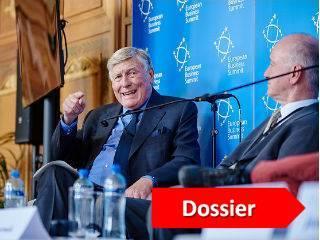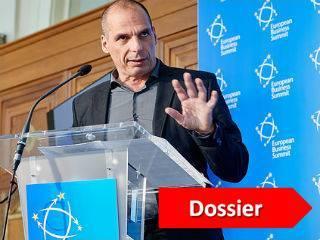
European Business Summit 2015
European Business Review, also this year media partner of EBS, selected, for its traditional EBR special report, five interesting performances during the summit.
Philippe De Buck (former President European Business) and Guo Ping (Dep. Chairman and Rotating President of Huawei Technologies) both had strong advice for Europe. De Buck urged to transform the economy to make it more successful for companies and for their employees; Guo Ping told to contribute more on the development of Industry System 4.0 to bring Europe back in a leading position in technologies.
Pierre Defraigne (Executive Director of Madariaga-College of Europe Foundation) gave a strong warning about the transatlantic trade negotiations; his advice was to put TTIP on hold and to look first in the direction of China and Russia, ‘Europe is not only a transatlantic power but also a Eurasian one’.
Very interesting was Greece’s Minister of Finance who told his audience that in his country there is the need to restore investments and faith, both decimated by seven years of debt’s deflation (2008-2015). But how can this be done, he asked. How can we restore investments and faith in line with disengagement speed?
EBR moderated the expert session organised by the Region of North Aegean (Greece), with the theme: what are the chances borders and peripheral regions might have? Four experts with different backgrounds tried to give an answer to this question.

Building a Broader Industry Ecosystem for Europe 4.0
Over the last ten years, the focus of digitisation has been on the service sector. Indeed, Internet has reshaped banking, retail, and many other sectors.
.jpg)
The competitiveness of Europe is the priority
For Europe, there are lessons to be learned from Taiwan. When there is the political will that stems from consensus among economic and social actors on what to achieve, and when there is a consistent and a well-defined roadmap, delivery is possible. The competitiveness of a country is manageable.

Innovation as a stimulus for Regional Growth
It is a fact that Cohesion policy for 2014-2020 adopts a new approach towards the necessity to address the needs that the economic crisis emerged. The new agenda aims at bridging the gap between public infrastructures and private investments [...].

Seven questions and three recommendations about TTIP
The European Business Summit is probably the ideal place to express dissenting views on TTIP, since in many ways it is the gathering of the two real contracting parties to TTIP: Business Europe and its counterpart the AmCham. In my opinion TTIP is currently too big to fly.

What is needed for Greece’s recovery
There is the need to restore investments and faith, both decimated by seven years of debt’s deflation (2008-2015). But how can this be done? How can we restore investments and faith in line with disengagement speed?



 By: N. Peter Kramer
By: N. Peter Kramer
